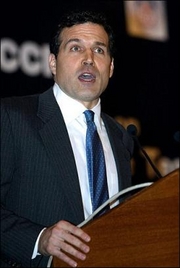The United States said it would revise laws to facilitate export of sensitive
high-technology equipment to China under a new policy.

Undersecretary of commerce for industry and
security David McCormick, seen here in November 2005. The United States
said it would revise laws to facilitate export of sensitive high
technology equipment to China under a new policy designed to prevent such
products from being used for military purposes.
[AFP] |
The new policy will spare the need for US
exporters in critical sectors such as semiconductor equipment and electronics to
apply for licenses for sales to companies in China.
It will also ensure closer scrutiny of key technology purchasers in China, a
senior US Department of Commerce official said.
The changes to Washington's so-called China Export Control Policy will
achieve "growth in civilian high-tech trade and enhanced security,"
undersecretary of commerce for industry and security David McCormick said.
"These changes to technology export controls for China are a 'win-win'", he
told a forum of the Washington-based Center for Strategic and International
Studies.
McCormick said Washington would urge other nations, particularly in Europe
and Japan, to take similar steps.
But he suggests Chinese companies demonstrate an established record of
nonproliferation and "responsible civilian use" of US high-tech products if they
wanted to be importers under the new policy.
"This process will require unprecedented openness and cooperation on the part
of Chinese companies. And it will create incentives for them to demonstrate good
faith and sound practices.
"In addition, it will allow US government officials to focus on more complex
cases with more severe implications for American security," he said.
The new policy, McCormick emphasized, would prevent exports of technologies
for incorporation into Chinese weapons systems.
For example, he said, US policy should facilitate sales of American-made
semiconductors to companies in China for use in stereos or a child's Game Boy,
but not for advanced missile systems or submarines.
Similarly, the cutting edge composite technology that helps China build
commercial aircraft must not also find its way into the Super-7 next generation
fighter aircraft, he said.
US high-tech exports to China last year reached more than 12 billion dollars
and the new licensing flexibility would further open up "potentially hundreds of
millions of dollars" worth of American sales to Chinese companies, McCormick
said.